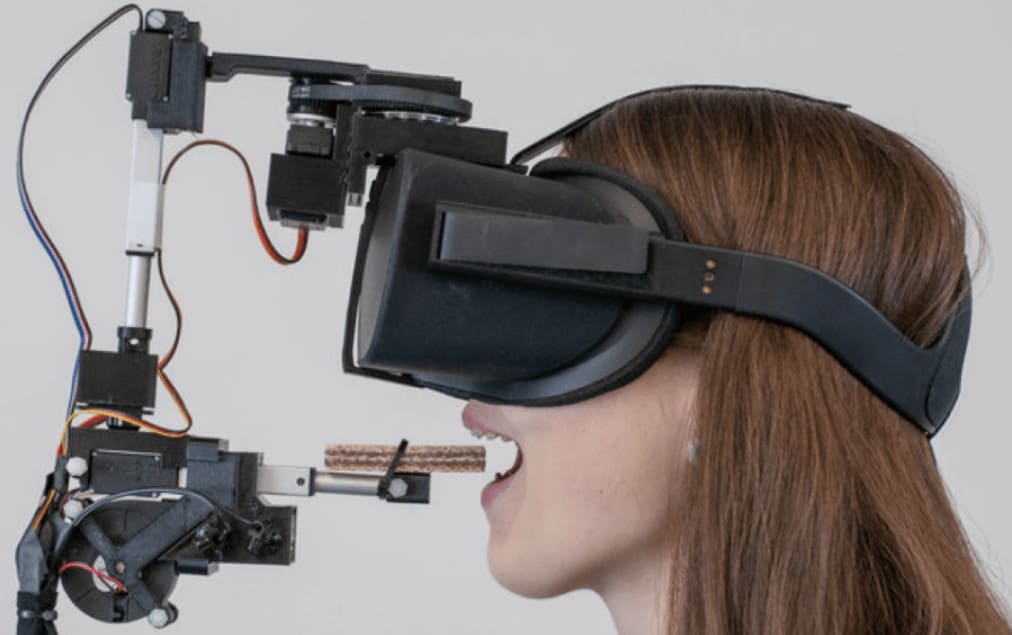Researchers to make the metaverse gross with mouth haptics for VR


A virtual reality (VR) experience can be jarring. There’s a surreal feeling of dislocation, and as many who have tried a game for the first time have discovered, the strangeness of motion in VR can even make you a little queasy. But our brains are pretty flexible and for most people, any disorientation passes quickly enough and they start playing games or watching videos. After all, it’s still a mostly visual experience.
Or it was mostly visual. That will change soon enough. Researchers from the Future Interfaces Group (or FIG) at Carnegie Mellon University’s Human-Computer Interaction Institute have designed a way to feel sensations on your lips, teeth, and tongue in virtual reality.
Haptic feedback equals a truly immersive experience. These days, that happens via handheld controllers with vibrating motors, leaving users feeling like disembodied heads and hands in cyberspace. FIG researchers viewed making haptics happen for the rest of the body (in a consumer-friendly way) as a worthy challenge. They decided to focus on the mouth, reasoning that the kisser is a close second in sensitivity terms to fingertips. This presented, as FIG stated in a study abstract, “a unique opportunity to add fine-grained haptic effects.”
During the research, FIG developed tiny ultrasonic transducers to create haptic effects for your mouth and went so far as to integrate their face-vibrating experiment into a device easily integrated into an existing VR headset. According to FIG, this could open up a new realm of realistic haptic feedback to VR experiences.
Like a giant spider spitting venom on your mouth. No, seriously. That was one of the experiments FIG devised — human lab rats willing to embrace the horror users walked through VR spiderwebs and entered a clearing. Breaking the webs launched the sensation of pulling the silken threads off the user’s face, but in a fit of sadism, the program then threw a virtual spider at the user’s mouth. This created the sensation of a spider skittering over the lips. Mercifully, the user could later shoot the spider with a flare gun, causing an explosion of spider goo that the same device ensured the victim — er, subject — could also feel.
Don’t worry, the other experiments were much more benign. They included drinking water from a fountain, drinking coffee, and smoking a cigarette. Which, if you weren’t a smoker before you got splashed with virtual spider muck, you’d probably become one afterward.
Some have noted one potential use for face-tickling ultrasonic transducers not mentioned in the report published by Carnegie Mellon — making out. It’s a no-brainer to assume that once such technology becomes widely available, virtual sex that almost feels authentic (until you imagine what you must look like to an observer) will happen. Or virtual tongue-hockey, at a minimum.
It will take a while for many elements of the VR experiment to shake off a certain creepiness. But in a world still riding out a pandemic, the ability to fool around as well as do mundane things in virtual reality sounds far more appealing than it might have sounded three years ago.
Read related posts:
- Your brain on crypto: How to manage cryptocurrency addiction
- Researchers: El Salvador’s crypto wallet is junk
- Tik Toker Michael Le launches play-to-earn gaming engine
Disclaimer
In line with the Trust Project guidelines, please note that the information provided on this page is not intended to be and should not be interpreted as legal, tax, investment, financial, or any other form of advice. It is important to only invest what you can afford to lose and to seek independent financial advice if you have any doubts. For further information, we suggest referring to the terms and conditions as well as the help and support pages provided by the issuer or advertiser. MetaversePost is committed to accurate, unbiased reporting, but market conditions are subject to change without notice.
About The Author
Managing editor, mpost.io. Former Deputy Digital Editor, Maxim magazine. Bylines in Observer, Inside Hook, Android Police, Motherboard. Author of official "Better Call Saul" tie-ins "Don't Go to Jail," and "Get off the Grid."
More articles

Managing editor, mpost.io. Former Deputy Digital Editor, Maxim magazine. Bylines in Observer, Inside Hook, Android Police, Motherboard. Author of official "Better Call Saul" tie-ins "Don't Go to Jail," and "Get off the Grid."


















































